I didn’t have many conversations with my father’s father. One of the few that I did have sticks out in my mind as I look at all the media coverage over Israel, Palestine and Hamas.
I had asked him why the large Oak tree in the front yard fell on his roof. The fact that a large powerful tree like that could topple over absolutely floored me.
He looked at me with that look he had that signified he was proud of the wit that was about to come forth and said, “I neglected to see the root of the problem.” As he said those words he stomped on a large rotted out root to the tree that had given way and which was now the cause that we all had to help grandpa get this tree off his house.
What’s the root of the problem here?
I can’t even count how many times I’ve heard people say that the current conflict in Israel is a fight that’s been raging for a thousand years. That if it hasn’t been solved now it won’t ever in the future.
Sure, this area has been highly contested ever since the bronze age. But so have other areas of the world.
I’ve also heard people throw around the word “Zionism” and claim that the Jews displaced Palestinians from their land. This is an important point to address because most people in the world are either ignorant on this issue or they’ve been straight lied to.
First of all Jews have lived in the land area called Palestine for thousands of years. Do they have claim to this land? Likewise, Arabs have lived in Palestine for thousands of years. Do they have claim to this land? The answer to both is an easy...Yes. They all have claim.
Jewish immigration back to Palestine.
Jews have been slowly migrating back to their ancestral homeland for hundreds of years. Palestine has always been a mixture of Jews, Muslims, Christians, Arabs, etc and the various cultures have made it work.
The two main groups leading up to WW1 were Jews and Palestinian Arabs. The Jews never displaced anyone while immigrating back to Palestine. They either went to the “Jewish area” or bought land from Arabs that lived elsewhere. Palestine’s boundary lines were already pretty much artificially set. Jews clumped in their area and Arabs in theirs.
What did Palestine look like before WW1? Mark Twain visited the Holy Land in 1867 and this is what he observed:
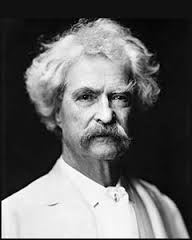
"...[a] desolate country whose soil is rich enough, but is given over wholly to weeds-a silent mournful expanse....A desolation is here that not even imagination can grace with the pomp of life and action....We never saw a human being on the whole route....There was hardly a tree or a shrub anywhere. Even the olive and the cactus, those fast friends of the worthless soil, had almost deserted the country."
So before the Jews began to come back to Palestine in significant numbers the entire area was desolate with a low population.
How about this for actual demographic numbers - The Jewish population from WW1 to WW2 increased by 470,000 people. In that same time frame the Arab population grew by….588,000. That’s a 120% population increase of Arabs in 20 years. So how were Jews displacing Arabs if the Arab population was growing faster than the Jewish?
The root.
The root of this problem is very easily traced. We don’t have to go back thousands of years. We needn’t go back further than 1916. 2 years had passed since the outbreak of WW1.
The Ottoman Empire was a major threat to the allies. More specifically to Great Britain who had built their Empire off the back of their navy which secured trade routes all over the world. To cripple the allies the Ottoman Empire could attempt to shut down the Red Sea trade route to the Indian Ocean. India was Great Britain’s crown jewel. Something had to be done to neutralize such a powerful threat that had a stranglehold on the most profitable trade route in the world.
Palestine throughout Ottoman Rule was a part of “Ottoman Syria” which encompassed present day Syria, Lebanon, Israel, parts of Iraq, and Jordan. Understanding these boundary lines is crucial for understanding current conflicts in this region. Even present day terrorist groups such as ISIS have made re-establishing these border lines as their eventual goal. Their name “Islamic State in Iraq and al-Sham” means that they wish to create a Caliphate within the old Ottoman Greater Syria area. Iraq and al-Sham is the territory pictured in the map. 
Arabs asked to attack the Ottomans
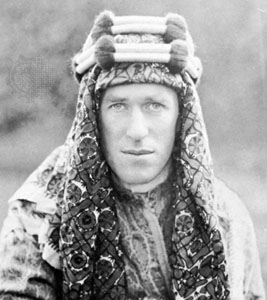
To neutralize the Ottoman threat Great Britain sent T.E. Lawrence to convince the Arabs to attack the Ottoman Empire.
Through Lawrence Great Britain promised much to the Arabs. If the Arabs would turn against the Ottomans Great Britain would help them establish a Greater Arab kingdom in it’s place.
Lawrence fought with two Arab brothers from the Hashemite tribe. The Hashemites were the most powerful Arabs at the time and controlled the Hejaz which is the land area where Mecca and Medina are located. The Hejaz is now within Saudi Arabia.
Both Abdullah I bin al-Hussein and Faisal bin Hussein bin Ali al-Hashimi commanded Arab armies. T.E. Lawrence had a much better relationship with Faisal and accompanied him along with his Northern Arab Army. Great Britain promised Faisal that he would be king of the new Arab monarchy that would replace the Ottomans.
Sykes-Picot Agreement
At the same time T.E. Lawrence is promising the Arabs a new super kingdom Great Britain and France hold secret negotiations to determine the fate of the Middle East post WW1. Great Britain was represented by Sir Mark Sykes and the French by François Georges-Picot.
The purpose of these negotiations was to define GB and France’s spheres of influence and determine who would control what should the Triple Entente win the war. It’s important to note that this was entirely contrary to what was promised to the Arabs who believed that they would assume majority control of the Middle East. As Faisal dreamed of ruling “Greater Syria” like the Ottomans did Sykes and Picot conspired otherwise.
In the end France, Great Britain, and Russia all signed off on a Middle East that looked like the picture below. The blue area would be French, the red area British, and the green area Russian.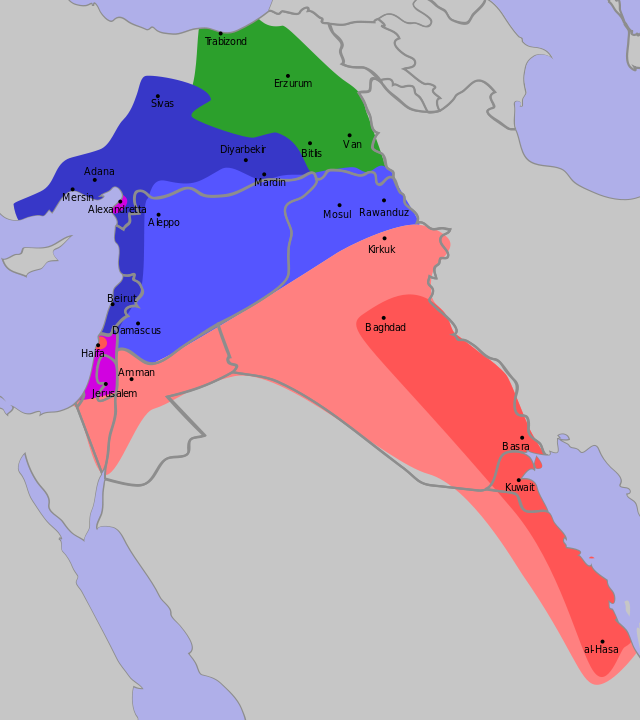
Great Britain and France never intended to honor their promises to the Arabs. Remember that their key concern was having an all powerful empire in the middle east that could dominate the Red Sea trade route. They toppled the Ottomans over it. They definitely weren’t about to allow another empire to spring up in it’s place.
The result of Sykes-Picot was a Middle East that had been forced to accept the Western European model of nation states. There were now lines drawn on the map that had never existed before. Borders were drawn along sectarian lines. It was clear that the French and British wanted a fractured and conflicted Middle East rather than united under Arab control.
King Faisal was given the Arabian coveted Kingdom of Syria. However, he was soon deposed after a coup attempt and then French occupation. To appease the Hashemites Faisal was made King of Iraq and his brother Abdullah was placed in charge of Transjordan (which means “other side of the Jordan”). The new nations of Syria and Lebanon were under French influence. Iraq and the new Mandates of Palestine and Transjordan were under British control.

The land of Palestine was now split. East of the Jordan river was given to the Hashemites under King Abdullah. West of the Jordan river was split based off of demographics. Heavily populated Jewish areas were separated from the heavily populated Arab areas. Peace in these areas was backed up by British troops.
It’s important to realize Arab resentment for the western allies after the realization of Sykes-Picot. The idea of ruling “Greater Syria” was an Arab dream that was shared all over the Middle East. However, Sykes-Picot had done it’s job in making it extremely difficult for Arabs to unite the entire area.
Arabs unite in another way
The Sykes-Picot spheres of influence were now backed by the League of Nations. If the Arabs wanted to make gains they would have to do it differently than how they toppled the Ottomans. They were given exactly what they needed when United Kingdom Foreign Secretary Arthur James Balfour sent a transmission to British jewish community leader Baron Rothschild. It would famously be known as the Balfour Declaration.
“His Majesty's government view with favour the establishment in Palestine of a national home for the Jewish people, and will use their best endeavours to facilitate the achievement of this object, it being clearly understood that nothing shall be done which may prejudice the civil and religious rights of existing non-Jewish communities in Palestine, or the rights and political status enjoyed by Jews in any other country.”
Arabs were against any further partitioning of al Sham (greater Syria). It’s important to note that they opposed a separate Palestinian State as well as a Jewish State. It would later be clarified that the British government did not intend to create a Jewish State. They would just guarantee a safe Jewish homeland within the mandate.
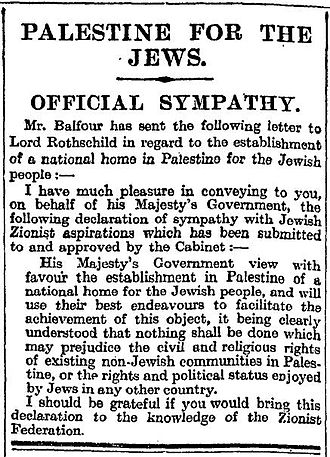
The Balfour Declaration helped the Arabs to unite under the banner of opposing a Jewish State. They began to declare that the British intended to make all of Palestine a Jewish State. Publications at the time ran this propaganda as if it were the truth (pictured above).
In 1936 Arabs revolted against the British occupying troops. Their main complaint was that Jewish immigration was becoming too extreme. This was obviously just an excuse to attack the British and Jews. Arab immigration to Palestine was far greater than Jewish.
The British would end up being successful in putting down the uprising. More significantly Jewish security forces and infrastructure would be solidified. This played a major role in future Jewish military successes.
Arabs change the argument
Arabs had effectively changed their argument. Their aspirations for a united Arab kingdom now took aim at the Jews.
The British Mandate for Palestine was set to end. In 1947 the UN adopted a resolution to partition Palestine. It called for: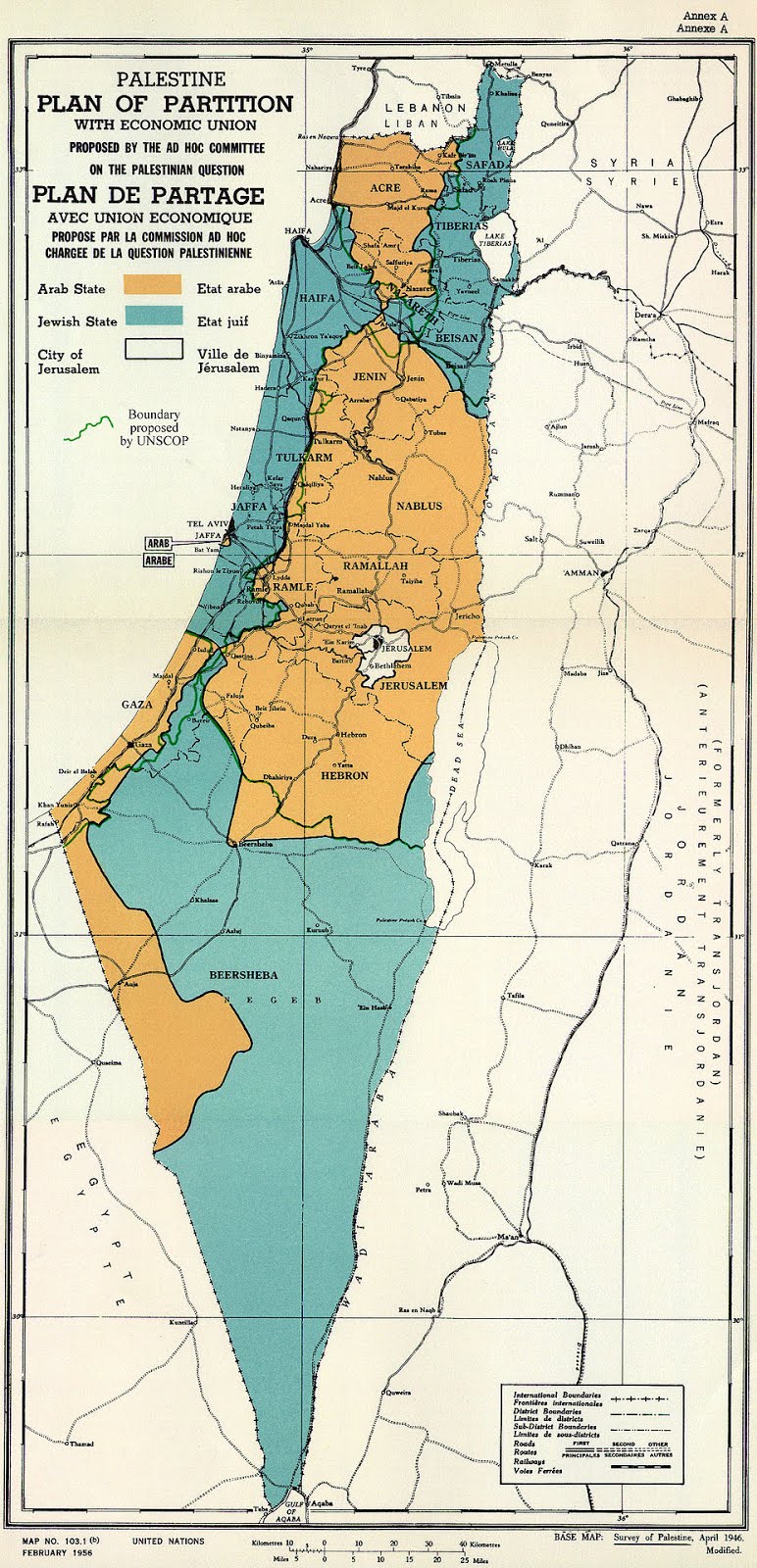
1. A Jewish State
2. A Palestinian State
3. A special international regime for the city of Jerusalem
Jews embraced the UN plan but the Arabs were furious. It’s very important to note that the Arabs not only did not support the Jewish state but they also didn’t support the Palestinian State either. The goal was for a fully unified Arab state or kingdom.
Arabs made the Jews the scapegoat and civil war began in Palestine.
The main players in the war were:
1. King Abdullah of Jordan
2. King Farouk of Egypt
3. Nuri as-Said of Iraq
4. Syria and Lebanon
This constituted the main players of the Arab League at the time. Their declared reason for invasion was to re-establish order in Palestine, stop the bloodshed, and to create a unitary Palestinian State. Not surprisingly they blocked the creation of a Palestinian government. They didn’t care about the Palestinian Arabs. They wanted an Arab sphere of influence without partitions. Again, Jews took the blame to rally their cause.
Miraculously the Jewish security apparatus held and the Arab League was embarrassed. It really wasn’t surprising once you realize what they were really after.
King Abdullah struck a secret deal with the Jews before the invasion even happened. He agreed not to press his attack into Jewish territory. Instead, when the invasion began he attacked the West bank and East Jerusalem. Read that again….instead of attacking the Jews (which was the Arab League rallying cry) he attacked the Palestinian Arabs! He invaded Arab Palestinian lands and occupied it. This land was never promised to the Jews in the UN partition plan so the Israelis let him have it.
Similar motivations were among the entire Arab League. King Farouk of Egypt wanted to annex southern Palestine for himself. Nuri as-Said of Iraq wanted the entire fertile crescent under his control. Syria and Lebanon wanted to annex portions of Northern Palestine.
They were after the land! They cared very little for the Palestinian Arabs living there. Most of whom were immigrants that came to Palestine in between WW1 and WW2.
Arab Nationalism
The Arab League’s defeat would begin an overall rise in Arab Nationalism. The rise of Egyptian President Gamal Abdel Nasser gave the Arabs a leader that had the potential to do what the Hashemites after WW1 had failed to.
In 1956 Nasser nationalized the Suez Canal. What Great Britain and France had feared the Ottomans may do back in WW1 was now a possibility again through Nasser and Egypt. Israel, Great Britain, and France made a secret deal to invade Egypt and topple Nasser. Israel invaded through the Sinai and France/Great Britain invaded via Port Said. After President Eisenhower condemned the action and appealed to the UN all forces withdrew. The end result was a perceived Arab victory and Nasser became the undisputed leader of the Arab world.
Pan-Arabism would take flight. Nasser’s popularity was starting to make the Arab monarchs in the region nervous. Syria was Egypt’s staunch ally but Jordan and Saudi Arabia feared that Nasser would try and upend their monarchies. Nasser formed the United Arab Republic with Syria. He would then go on to orchestrate a coup in Iraq and brought Iraq in under the UAR umbrella as well.
After the successful coup in Iraq Nasser would be quoted saying this:
“The holy march on which the Arab nation insists, will carry us forward from one victory to another ... the flag of freedom which flies over Baghdad today will fly over Amman and Riyadh. Yes, the flag of freedom which flies over Cairo, Damascus, and Baghdad today will fly over the rest of the Middle East”
Nasser’s goal was to bring in every Arab nation into the UAR. It was ambitious and not doable at the time. He decided to turn his attention to Palestine. After all, uniting the lands of Palestine, Jordan, Iraq, and Syria has always been the ultimate goal. It was obvious how to gain full Arab support for the acquisition of Palestine. Make it a war on the Jews.
6 day war
Turning the conquest of Palestine into an Arab war vs Israel was all that was needed to bully Jordan and Saudi Arabia into supporting the UAR. Nasser blockaded the Straits of Tiran (equivalent to an act of war) and began a massive military buildup in the Sinai along the Israeli border. Israel would strike first. 6 days later it was all over. Israel decimated the Arab armies. They would end up taking control of Gaza, the West Bank, East Jerusalem, and the Golan Heights.
It’s interesting to note Jordan’s unique situation. Nasser basically lied to and bullied them into the war. Like Israel, Jordan was also fighting Palestinian Arab extremists groups. The PLO wanted Jordan out of not only the West bank but the Jordan land area altogether. Jordan was also criticized by much of the Arab world for occupying the West Bank. When Jordan abandoned the West Bank and East Jerusalem their status with the Arab League increased. They also now had Israel as a larger partner in fighting the PLO.
Palestinian extremist groups would continue to fight Jordan bitterly. The PLO wanted to rule Jordan instead of the Hashemite Monarchy. Jordan retaliated by killing thousands of Palestinians led by Yasser Arafat. Not only were Palestinian Arabs killed by the thousands but they were completely displaced out of the country by the Jordanians. The PLO had to relocate to Lebanon.
The PLO then shifted the majority of their attacks now toward Israel. This resulted in a civil war in Lebanon and the eventual expulsion of the PLO to Tunisia. A relatively small Shia militia named Hezbollah grew in power from these ashes.
Wrapping up
If Israel suddenly didn’t exist we’d still have conflict in Palestine. The Jordanians would still want the West Bank and Jerusalem, the Egyptians would try and annex Southern Palestine, and Syria would annex Northern Palestine. Arab vs Arab fighting would be even bloodier than Israeli vs Arab.
Israel has been made the ultimate scapegoat by Arab nationalists looking for expansion in Palestine. Palestinian extremist groups were seen as terrorists when attacking the Jordanians or inciting destabilization in Lebanon. But when they attack Israel and use Arabs as human shields Israel is suddenly the terrorist? Ironically Israel now is a stabilizing element in a volatile Middle East. They’re silent partners with Jordan and provide border security along Syria and Lebanon’s southern borders. This at a time when both Syria and Lebanon have much larger problems to deal with.
Eventually the Middle East will correct itself from the damage of Sykes-Picot and all that happened from then on. Until then we’re sure to see another “Nasser” willing to make the conquest of Palestine appear as an Arab vs Jew conflict. It’s up to you to be informed enough not to fall for the propaganda of a Hamas, Fatah, Hezbollah, etc. The demonizing of Israel is really about Arab conquest of Palestine. As long as the finger is pointed at Israel the longer the world will be kept in the dark on what the actual purpose is for.




